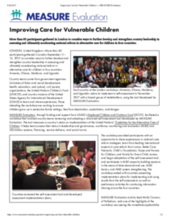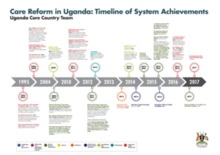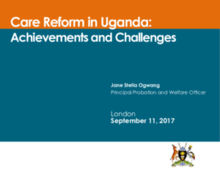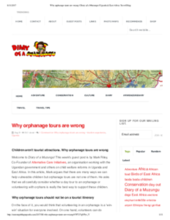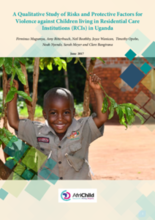This country page features an interactive, icon-based data dashboard providing a national-level overview of the status of children’s care and care reform efforts (a “Country Care Snapshot”), along with a list of resources and organizations in the country.
demographic_data
childrens_living_arrangement
children_living_without_bio
social_work_force
key_stakeholders
Key Stakeholders
Add New DataOther Relevant Reforms
Add New Datadrivers_of_institutionalisation
Drivers of Institutionaliziation
Add New Datakey_research_and_information
Key Data Sources
Add New DataThe Children Act (Uganda)
Country Care Review: Uganda
Prevalence and number of children living in institutional care: global, regional, and country estimates
The National Integrated Early Childhood Development Policy Action Plan (2016-2021) of Uganda
Catholic Care for Children in Uganda: A Family for Every Child - Findings from a Midterm Evaluation
Acknowledgements
Data for this country care snapshot was contributed by a consultant with the Data for Impact (D4I) Project at Palladium Group LLC.
Displaying 221 - 230 of 418
This video series from Better Care Network, in partnership with Child's i Foundation, highlights promising practices in children's care in Uganda.
International actors and representatives from Armenia, Ghana, Moldova, and Uganda convened in London September 11-15 2017 to learn and share experiences to inform the alternative care reform process in the four countries.
This infographic provides a historical timeline of the alternative care reform process in Uganda, marking key achievements in the establishment of policies, guidelines, procedures, and programs to improve the quality of care and protection for children without adequate family care.
This presentation by the Principal Probation and Welfare Officer of Uganda outlines the basic demographic data of Uganda and provides an overview of the situation of children's care, and care reform efforts, in the country.
An inspection of children's homes in the Mukono Municipality of Uganda revealed that most were not meeting minimum standards; in response, municipality leaders have suspended the registration of new children's homes and orphanages in the area.
This blog post underlines the issues with orphanage volunteering and tourism, including its developmental and emotional impact on children and how it fuels the continuation of orphanages and diverts resources away from family preservation and reunification.
A new financing mechanism has been proposed in Uganda to provide financial support to Ugandan families living in poverty with children under age two, with the intention of supporting young children in families and keeping them out of institutional care.
Catholic Relief Services (CRS)/4Children is recruiting for a Case Management Rapid Response (CMRR) Program Manager in Uganda.
In this video, Kate van Doore describes the process of 'paper orphaning,' a term coined to characterize how children are recruited and trafficked into orphanages to gain profits through international funding and orphanage tourism.
This qualitative study of risks and protective factors for violence against children living in
Residential Care Institutions (RCIs) for children is part of the wider qualitative study on violence
against children in Uganda. The study complements the national wellness survey that sought to
measure the prevalence of violence against children in household, schools and the community from
a quantitative perspective

